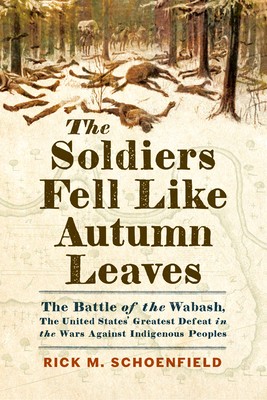
- We will send in 10–14 business days.
- Author: Rick M Shoenfield
- Publisher: Westholme Publishing
- ISBN-10: 1594164231
- ISBN-13: 9781594164231
- Format: 16 x 23.1 x 2.5 cm, kieti viršeliai
- Language: English
- SAVE -10% with code: EXTRA
Reviews
Description
The largely forgotten 1791 Battle of the Wabash, near present-day Fort Recovery, Ohio, was the greatest Native American triumph, and the United States military's worst disaster, in more than a century of Indian wars. This, despite the US army having artillery and outnumbering the Maumee Confederation warriors by almost two to one. It was the Unites States' first war and its first undeclared war. The defeat of General Arthur St. Clair triggered the first Congressional investigation and the first assertion of executive privilege. Often overlooked is that no other Native American battle in three centuries, from colonial times to Geronimo, affected so many lives. The Maumee Confederation's victory largely stymied expanding American settlement in Ohio for almost four years. With the floodgates of settlement closed, expansion into the rest of the Northwest Territory, and ultimately into the Great Plains, was also impeded. The book places the war in the context of cultural, racial, economic, political and environmental conflicts. For the first time, the ecological context is explored, for at stake in the clash between Woodland Native Americans and white, agrarian settlement, was the fate of a vast forest eco-system. The issue echoes today in conflict over climate, deforestation, and indigenous control of their forests.
EXTRA 10 % discount with code: EXTRA
The promotion ends in 23d.13:17:37
The discount code is valid when purchasing from 10 €. Discounts do not stack.
- Author: Rick M Shoenfield
- Publisher: Westholme Publishing
- ISBN-10: 1594164231
- ISBN-13: 9781594164231
- Format: 16 x 23.1 x 2.5 cm, kieti viršeliai
- Language: English English
The largely forgotten 1791 Battle of the Wabash, near present-day Fort Recovery, Ohio, was the greatest Native American triumph, and the United States military's worst disaster, in more than a century of Indian wars. This, despite the US army having artillery and outnumbering the Maumee Confederation warriors by almost two to one. It was the Unites States' first war and its first undeclared war. The defeat of General Arthur St. Clair triggered the first Congressional investigation and the first assertion of executive privilege. Often overlooked is that no other Native American battle in three centuries, from colonial times to Geronimo, affected so many lives. The Maumee Confederation's victory largely stymied expanding American settlement in Ohio for almost four years. With the floodgates of settlement closed, expansion into the rest of the Northwest Territory, and ultimately into the Great Plains, was also impeded. The book places the war in the context of cultural, racial, economic, political and environmental conflicts. For the first time, the ecological context is explored, for at stake in the clash between Woodland Native Americans and white, agrarian settlement, was the fate of a vast forest eco-system. The issue echoes today in conflict over climate, deforestation, and indigenous control of their forests.


Reviews